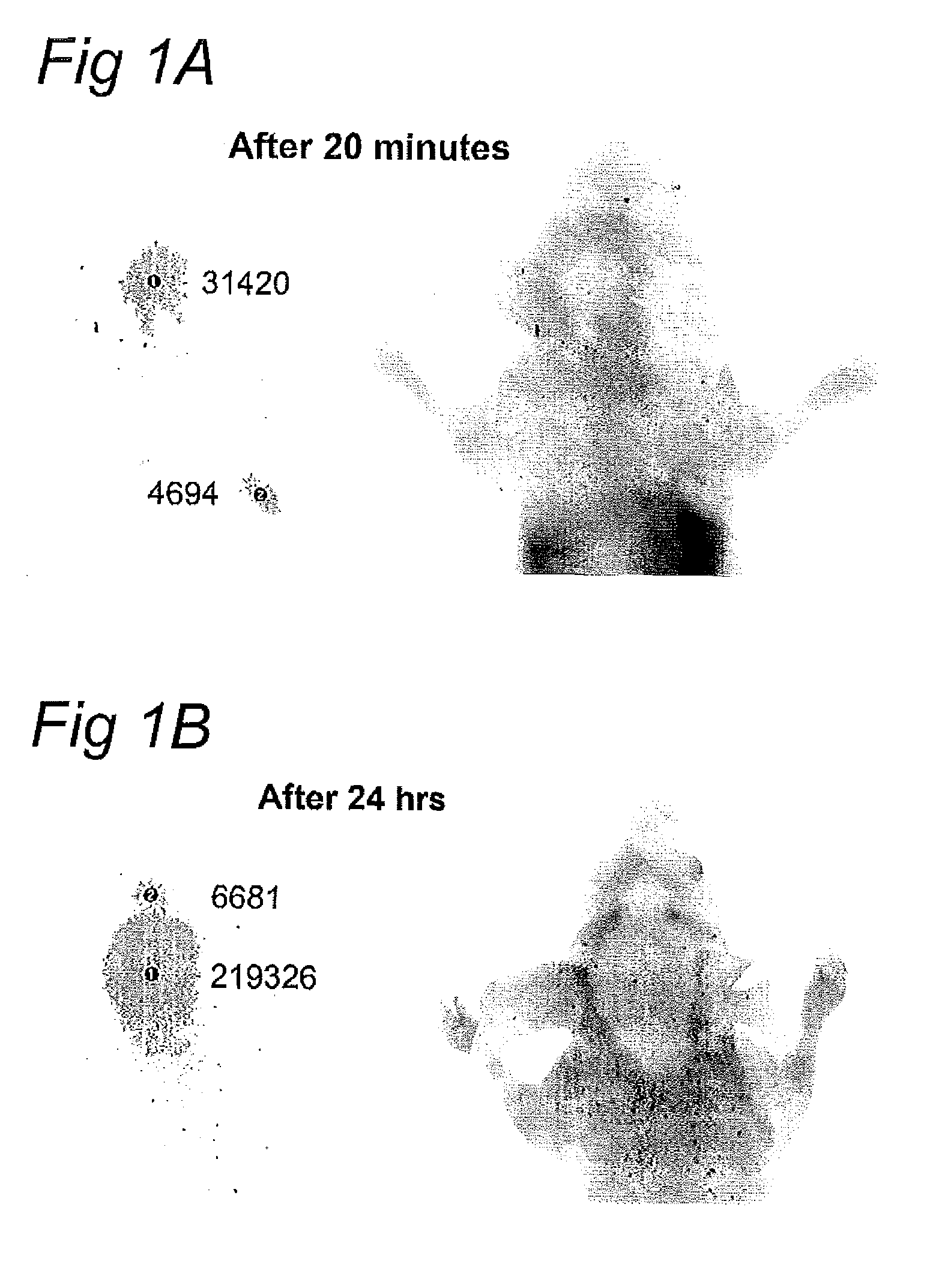Molecules for targeting compounds to various selected organs, tissues or tumor cells
a technology of compounds and molecules, applied in the field of in vivo targeting, can solve the problems of poor in vivo neuronal uptake of these aons, the biggest hurdle to overcome, and the inability to achieve in vivo uptake, so as to improve the effect of in vivo uptak
- Summary
- Abstract
- Description
- Claims
- Application Information
AI Technical Summary
Benefits of technology
Problems solved by technology
Method used
Image
Examples
example 1
In Vitro Uptake into Neuroblastoma and Neuronal Differentiated Cells
[0047]A selection of peptides was synthesized and provided with a fluorescent label (FAM) and screened for uptake on mouse neuroblastoma cells in vitro.
[0048]N1E-115 mouse neuroblastoma cells were incubated with the FAM-labeled peptides and photographed with an inverted fluorescence microscope, without previous fixation. As shown in the photographs, peptides LPWKPLG and THRPPMWSPVWP (SEQ ID NO: 1) were the only peptides that were efficiently taken up by the neuroblastoma cells. It was shown that the uptake results in an uniform staining of the cytoplasm as well as the nucleus of the cells.
[0049]Rat neuronal pheochromocytoma PC12 cells that were differentiated into a neuronal cell type by adding nerve growth factor (NGF) were incubated with the FAM-labeled peptide THRPPMWSPVWP (SEQ ID NO: 1) and photographed with an inverted fluorescence microscope, without previous fixation. The photographs showed uptake of the pept...
example 2
In Vivo Targeting to Brain Cells
[0050]Peptide THRPPMWSPVWP (SEQ ID NO: 1) was labeled with a Cy5 fluorescent label and 7 nmol was injected intravenously into the tail vein of a nude mouse. Pictures were taken with a Maestro imaging system using the filters for Cy5 detection.
[0051]FIG. 1 shows the uptake of the peptide after 20 minutes (FIG. 1A) and after 24 hours (FIG. 1B), On the right side of FIGS. 1A and 1B, the bright light image of the mouse is combined with the detected Cy5 label shown as light blue staining. On the left side of FIGS. 1A and 1B the detected Cy5 pattern is shown separately in red for quantitation. The numbers on the left side indicate the amount of detected Cy5 label. The mouse is lying face down and a clear signal could be detected in the brain, already 20 minutes after injection. This indicates that peptide THRPPMWSPVWP (SEQ ID NO: 1) is able to cross the blood brain barrier and is subsequently taken up by the brain cells.
example 3
Downregulation by Peptide-AON Conjugates in N115 Neuroblastoma Cells
[0052]Peptides THRPPMWSPVWP (SEQ ID NO: 1) and LPWKPLG (SEQ ID NO: 2) were conjugated to an siRNA molecule or a DNA phosphorothioate antisense oligonucleotide (AON). This siRNA and AON have been shown to be able to downregulate the DCL (doublecortin-like) gene in N115 neuroblastoma cells (unpublished observations). N115 neuroblastoma cells were incubated with the conjugates at 500 nM. After 48 hr the cells were harvested and gene silencing was detected by Western blot analysis as described (Vreugdenhil et al., 2007, Eur. J. Neurosci. 25, 635-648). In table 1 the percentage DCL downregulation of each conjugate at different concentrations is shown. All conjugates were able to induce DCL downregulation in N115 cells.
[0053]
TABLE 1DCL downregulation in N115 cells by peptide-AONconjugates at different concentrationsconcentration% down-AON-(conjugate)(nM)regulationLPWKPLG-AON50062%(SEQ ID NO: 2)LPWKPLG-siRNA50099%(SEQ ID N...
PUM
| Property | Measurement | Unit |
|---|---|---|
| length | aaaaa | aaaaa |
| half life time | aaaaa | aaaaa |
| chirality | aaaaa | aaaaa |
Abstract
Description
Claims
Application Information
 Login to View More
Login to View More - R&D
- Intellectual Property
- Life Sciences
- Materials
- Tech Scout
- Unparalleled Data Quality
- Higher Quality Content
- 60% Fewer Hallucinations
Browse by: Latest US Patents, China's latest patents, Technical Efficacy Thesaurus, Application Domain, Technology Topic, Popular Technical Reports.
© 2025 PatSnap. All rights reserved.Legal|Privacy policy|Modern Slavery Act Transparency Statement|Sitemap|About US| Contact US: help@patsnap.com

